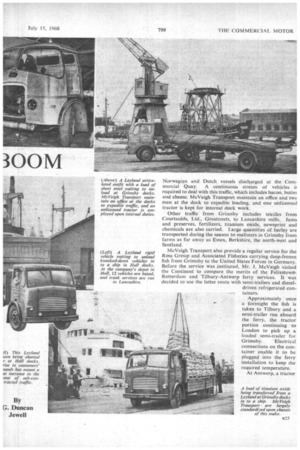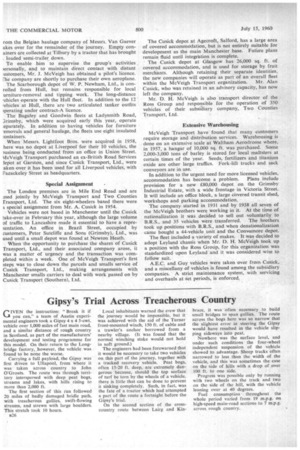BATTLING AGAINST I
Page 58

Page 59

Page 60

If you've noticed an error in this article please click here to report it so we can fix it.
WHEN there is a tyside boom in a particular area, and heavy demands are made on hauliers, it is not easy for them to decide whether the additional traffic will be permanent. Therefore they have to consider whether the need is to be met by applications for additional vehicles, an increase in sub-contracting, or by other means.
These conditions currently exist in north Lincolnshire, where industrialization on the south bank of the Humber, increasing imports into Grimsby and the expansion of the frozen-food trade have posed this very problem for McVeigh Transport, Ltd.
The company have dealt with it by exploiting the use of articulated vehicles and sub-contracting on a large scale. The provision of spare semi-trailers enables ships to be cleared quickly. Even so, it is becoming more difficult to meet requirements as transport capacity is absorbed.
In order to provide the service demanded by customers; Mr. D. H. McVeigh, managing director, and Mr. J. McVeigh, general manager, have spread their contacts with other operators over a 70-mile radius from Grimsby. The result has been that although the Grimsby depot at Convamore Road operates 46 A-licensed and two B-licensed vehicles, the turnover figure for sub-contracting considerably exceeds that for their own vehicles.
This position is disliked. Excessive hiring has led to many complaints from customers. The company's regular subcontractors, of whom 14 are almost wholly employed and carry McVeigh headboards, give satisfaction, but too much casual hiring results in an increase in claims and loss of customers. In addition to the Grimsby headquarters, McVeigh Transport have depots at Louth (five vehicles), Hull (12), London (six), and Manchester. Subsidiary companies include W. P. Newham, Ltd., Scarborough (16 vehicles); Messrs. Lightfoot Bros., Liverpool (10); Baguleys (1926) Removals, Ltd., and J. R. Goodwin and Co., Ltd.., Grimsby (19); and Cusick Transport, Ltd., Manchester, Liverpool and Glasgow (49). The company also have a 50-per-cent. interest in Cusick Transport (Southern), Ltd., Parkstone, Bournemouth (24 vehicles).
Trunk services operate from •Grimsby to Manchester, Birmingham and London; Hull to Lancashire; and Manchester to London, Glasgow, Bournemouth and South Wales.
At Grimsby, where outwards dock traffic averages about 1,750 tons a week, there are 29 tractors and 46 semi-trailers working Danish, Norwegian and Dutch vessels discharged at the Commercial Quay. A continuous stream of vehicles is required to deal with this traffic, which includes bacon, buttet and cheese. McVeigh Transport maintain an office and two men at the dock to expedite loading, and one unlicensed tractor is kept for internal dock work.
Other traffic from Grimsby includes textiles from Courtaulds, Ltd., Greatcoats, to Lancashire mills. Jams and preserves, fertilizers, titanium oxide, newsprint and chemicals are also carried. Large quantities of barley are transported during the season to maltsters in Grimsby from farms as far away as Essex, Berkshire, the north-west and Scotland.
McVeigh Transport also provide a regular service for the Ross Group and Associated Fisheries carrying deep-frozen fish from Grimsby to the United States Forces in Germany.
Before the service was instituted, Mr. J. McVeigh Visited the Continent to compare the merits of the Felixstowe Rotterdam and Tilbury-Antwerp ferry services. It was decided to use the latter route with semi-trailers and dieseldriven refrigerated containers.
Approximately once a fortnight the fish is taken to Tilbury and a semi-trailer run aboard the ferry, the tractor portion continuing to London to pick up a loaded semi-trailer for Grimsby. Electrical connections on the container enable it to be plugged into the ferry installation to keep the required temperature.
At Antwerp, a tractor
rom the Belgian haulage company of Messrs. Van Gaever akes over for the remainder of the journey. Empty conainers are collected at Tilbury by a tractor that has brought loaded semi-trailer down.
To enable him to supervise the group's activities iersonally, and to maintain direct contact with distant .ustomers, Mr. J. McVeigh has obtained a pilot's licence. [he company are shortly to purchase their own aeroplane.
The Scarborough depot of W. P. Newham, Ltd., is conrolled from Hull, but remains responsible for local urniture-removal and tipping work. The long-distance rehicles operate with the Hull fleet. In addition to the 12 ,thicles at Hull, there are two articulated tanker outfits iperating under contract-A licence.
The Baguley and Goodwin fleets at Ladysmith Road, 3rirnsby, which were acquired early this year, operate eparately. In addition to having vehicles for furniture .emovals and general haulage, the fleets use eight insulated :ontainers.
When Messrs. Lightfoot Bros. were acquired in 1958, here was no depot at Liverpool for their 10 vehicles, the )usiness being conducted from an office in Union Street. VIcVeigh Transport purchased an ex-British Road Services lePot at Garston, and since Cusick Transport, Ltd., were aken over it has been used for all Liverpool vehicles, with Fazackeley Street as headquarters.
Special Assignment • The London premises are in Mile End Road and are ised jointly by McVeigh Transport and Two Counties Transport, Ltd. The six eight-wheelers based there were special assignment from Mr. A. Cusick in 1954.
Vehicles were not based in Manchester until the Cusick Lake-over in February this year, although the large volume of traffic to Lancashire made it essential to have a representation. An office in Brazil Street, occupied by aistomers, Peter Sutcliffe and Sons (Grimsby),. Ltd., was used until a small depot was found at Newton Heath.
When the opportunity to purchase the shares of Cusick Transport, Ltd., and their associated company arose, it was a matter of urgency and the transaction was completed within a week. One of McVeigh Transport's first steps was to close down the parcels and smalls service of Cusick Transport, Ltd., making arrangements with Manchester smalls carriers to deal with work passed on by Cusick Transport (Southern), Ltd. The Cusick depot at Agecroft, Salford, has a large area of covered accommodation, but is not entirely suitable for development as the main Manchester base. FutUre plans remain fluid until integration is complete.
The Cusick depot at Glasgow has 26,000 sq. ft. of covered accommodation, and is used for storage by fruit merchants. Although retaining their separate identities, the new companies will operate as part of an overall fleet within the McVeigh Transport organization. Mr. Alan Cusick, who was retained in an advisory capacity, has now left the company.
Mr. D. H. McVeigh is also transport director of the Ross Group and responsible for the operation of 350 vehicles of their subsidiary company, Two Counties Transport, Ltd.
Extensive Warehousing
McVeigh Transport have found that many customers require storage and distribution services. Warehousing is done on an extensive scale at Waltham Aerodrome where, in 1957, a hangar of 10,000 sq. ft. was purchased. Some 2,000-3,000 tons of barley is stored for local maltsters at certain times of the year. Seeds, fertilizers and titanium oxide are other large traffics. Fork-lift trucks and sack conveyors are in use.
In addition to the urgent need for more licensed vehicles, accommodation has become a problem. Plans include provision for a new £80,000 depot on the Grimsby Industrial Estate, with a wide frontage in Victoria Street. It will include an office block, a large covered transit shed, workshops and parking accommodation. The company started in 1931 and by 1938 all seven of the McVeigh brothers were working in it. At the time of nationalization it was decided to sell out voluntarily to B.R.S., and 35 vehicles were transferred. The brothers took up positions with B.R.S., and when denationalization came bought a 44-vehicle unit and the Convamore depot.
The fleet included a variety of makes. It was decided to adopt Leyland chassis when Mr. D. H. McVeigh took up a position with the Ross Group, for this organization was standardized upon Leyland and it was considered wise to follow suit.
A.E.C. and Guy vehicles were taken over from Cusick, and a miscellany of vehicles is found among the subsidiary companies. A strict maintenance system, with servicing and overhauls at set periods, is enforced.




















































































































